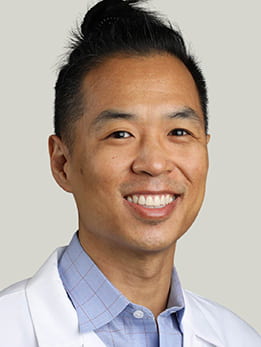Welcome from Our Program Director
Dr. James Ahn

Welcome to the University of Chicago!
As the second oldest training program, our residency has a rich history of upholding a singular mission: to train leaders in healthcare. We do this via a tripartite model: professional development within and outside the emergency department, a commitment to our community, and humanizing the process of residency training.
The development of leaders in healthcare begins with outstanding clinical development. As a program, we serve the South Side of Chicago that is plagued by health inequities. These disparities in health care have unfortunately created a patient population that is complex and critically ill. The South Side of Chicago is also afflicted by gun violence which has made the University of Chicago the busiest trauma center in Chicago. Residents care for our patients in an early autonomy model that provides the environment necessary to become exceptional physicians that are independent critical thinkers and outstanding proceduralists. Graduates of our program will be able to work and succeed in any clinical environment!
We also want to maximize your professional development outside of the clinical space through the devotion of resources to cultivate your passion within medicine. As a program we offer multiple formal mentorship avenues (including life coaches), support for conference travel, research funding, and curricula to nourish your niche. In addition to the mentorship available at the University of Chicago, we offer a diverse and accomplished alumni base that constantly engages with our trainees.
When developing leaders in emergency medicine, we feel that it is important that the future generation of physicians understands and endeavors to improve health inequities. Further as a residency program on the South Side of Chicago, we recognize that our responsibility includes a duty to the community. Because of this duty, in addition to didactic and simulation curriculum, trainees engage in service and engagement opportunities that are part of our clinical rotations. This integration of social medicine within the residency experience is critical to our mission and value system.
Finally, we are very aware that the pursuit of excellence during residency must also be balanced. At the University of Chicago, we achieve this equilibrium by continuing to humanize the training process. This humanization occurs through many processes and options since it is impossible to create a singular pathway for all. Key examples include: providing extra funding support during difficult rotations, dedicated curricula, spousal support groups, University-based therapy options, monthly residency-wide social events. The goal of our program is to produce leaders in healthcare while keeping the fundamental elements of yourself sustained and nurtured during training.
In short, our program will provide all the materials for you to become a leader in emergency medicine and we would love for you to join us!
